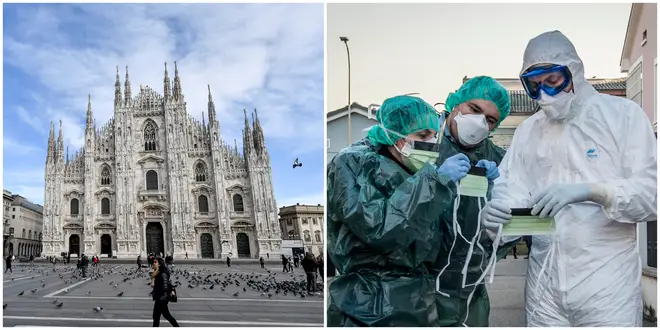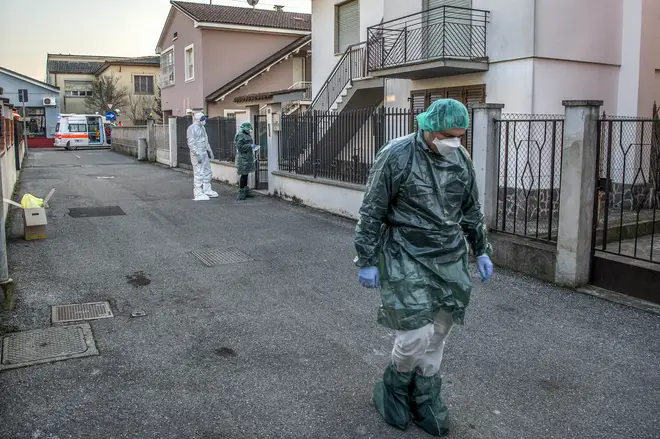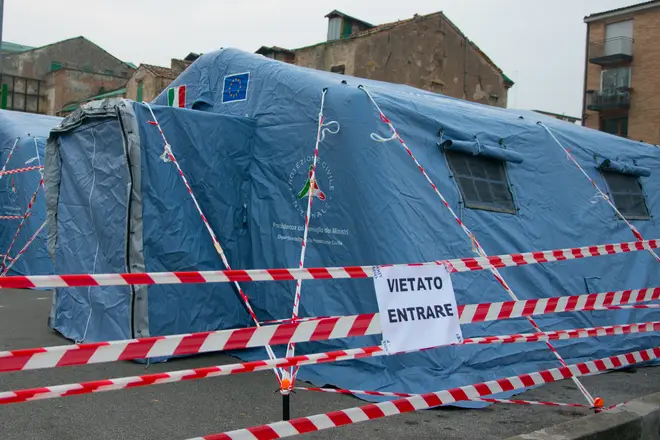
Simon Marks 3pm - 7pm
27 February 2020, 00:36 | Updated: 27 February 2020, 07:03

Italian authorities have pleaded for Europe to work together with them to prevent the spread of coronavirus, as cases in Italy reached 400.
Earlier today it was announced that 12 people have died in Italy, and 11 towns in the north of the country have been placed under quarantine in an attempt to stem the spread of the illness.
Italian premier Giuseppe Conte's government appealed to European neighbours for cooperation, not isolation and discrimination as his country struggles to contain the rapidly spreading outbreak.
The increase in cases means that Italy now has more coronavirus cases outside Asia than anywhere else.
"Viruses don't know borders and they don't stop at them," Italian health minister Roberto Speranza said at the start of a crisis meeting with World Health Organisation and European Union representatives in Rome.
All of the Italian victims of were elderly, having other health conditions or both, civil protection chief Angelo Borelli said.
The Italian government has defended its handling of the crisis, even as it acknowledges alarm over its increasing cases and inability to locate the origin of the two clusters in the northern Lombardy and Veneto regions.

Worldwide, 81,385 people have been diagnosed with coronavirus - officially known as Covid-19 - and 2,771 deaths have been recorded.
But the World Health Organisation has yet to class the outbreak as a 'pandemic', with director-general Tedros Adhanom Ghebreyesus saying on 24 February: "Does this virus have pandemic potential? Absolutely, it has. Are we there yet? From our assessment, not yet."
A statement released by the WHO earlier today acknowledged that coronavirus is now spreading faster in areas outside of China - the epicentre of the infections.
It said figures from the World Health Organisation (WHO) showed there were 427 new cases reported in 37 countries on Tuesday, compared with 411 reported by Beijing.
Germany and France also reported two cases apiece in people with no known ties to Italy, travel to China or contact with an infected person, raising concern about additional clusters of no known origin possibly forming in Europe.
"We are at the beginning of a coronavirus epidemic in Germany," German health minister Jens Spahn said, adding that he had asked state health officials to review their emergency plans for pandemics.
Greece and neighbouring North Macedonia registered their first confirmed virus cases on Wednesday, also involving people who recently travelled to Italy's afflicted north.
The first cases reported in Austria, Croatia and Switzerland on Tuesday also had travel ties to northern Italy.
Spain has reported nine new cases since Monday, all with an Italy link, two of France's five new cases had ties to Italy and Finland reported its second case in someone who had been in Milan, Lombardy's capital.
Local authorities in Austria took quarantine measures after two unconfirmed cases had an Italy link, only to remove them when tests came back negative.
Over a 24-hour period from Tuesday to Wednesday, Italy confirmed 78 more cases, for a national total of 400. Hard-hit Lombardy, where 10 towns are on army-guarded lockdowns, still had the most cases with 288 - four of them children. But Veneto saw a spike of 28 cases overnight, bringing its total to 71.
In France, a 60-year-old Frenchman died in a Paris hospital, France's second virus-related death.
His case worried French authorities, because he was one of two new patients who tested positive for the virus in France this week who had not travelled to a "risk zone," according to authorities in his home region north of Paris.
A German man with the virus was in a critical condition and his wife also tested positive, but German officials to date have not been able to trace the origin of their contagion.
Officials expressed fear of infections spreading since the wife works in a kindergarten and the man had been to carnival parties.
The man had come into contact with dozens of people, including doctors and nurses at a Cologne hospital where he had gone for an unrelated health check-up, German officials said. Schools and kindergartens in the area where he became ill remained shut.

Austria, Croatia and Switzerland also reported their first cases linked to the outbreak in Italy, while Spain and France recorded new ones, also involving people who had been to northern Italy.
The first positive test in South America has also been recorded in a 61-year-old Brazilian man who had recently been to northern Italy.
Health Secretary Matt Hancock told MPs on Wednesday that 7,132 people in the UK have so far been tested.
Of these, 13 have tested positive, of whom eight have been discharged from hospital.
He said the NHS is looking to extend home testing while a new public information campaign will be launched.
Speaking in the Commons, Mr Hancock suggested that home testing will be rolled out more widely to complement existing hospital testing and the "isolation pods" which have been sited at hospitals in England for people who turn up at A&E with symptoms.
He said: "We now have testing sites at all A&E facilities, as far as we know, across England.
"But we're also planning to introduce home testing and some of this has started already so that people don't have to go to the pods in front of A&E which have been put there to ensure that people don't actually go into A&E where they might infect others.
"Home testing is the safest place to be tested because then you don't have to go anywhere, and that will allow us to roll out testing to a much larger number of people as well."
A number of schools in the UK have told staff and pupils to stay at home after returning from ski trips to northern Italy, where several towns in the Lombardy and Veneto regions remain on lockdown.
Four pupils at Prince George and Princess Charlotte's primary school, Thomas's Battersea, were reportedly sent home as a precautionary measure following a trip to northern Italy.
At least eight schools have closed despite national guidance urging them to stay open.
But Mr Hancock urged schools not to close unless they had a confirmed case of the virus.
He added: "There is no need to close the school or send other students or staff home."
The Foreign Office in the UK has updated its guidance on travel to Italy, advising against all but essential travel to 10 towns in Lombardy (Codogno, Castiglione d'Adda, Casalpusterlengo, Fombio, Maleo, Somaglia, Bertonico, Terranova dei Passerini, Castelgerundo and San Fiorano) and one in Veneto (Vo' Euganeo).
The Queen's granddaughter Zara Tindall and her husband, former England rugby player Mike Tindall, will not be self-isolating following their return from a skiing trip to northern Italy, a spokeswoman for the couple said.
The spokeswoman said the couple were following official Government advice, but were not self-isolating as they are not showing any symptoms of the infection.
It is understood the couple returned from their ski trip to Bormio, in the Lombardy region of Italy, last week.
In London, energy firm Chevron asked about 300 British employees to work temporarily from home after an employee in its Canary Wharf office reported a flu-like illness.
And a second London office for OMD Media in Fitzrovia closed earlier today over fears of the virus.
Meanwhile, Britons at a coronavirus-hit hotel in Tenerife have been told to take their own temperatures and said there is confusion over whether they should stay in their rooms.
An Italian man and his wife were diagnosed with coronavirus during their stay at the four-star H10 Costa Adeje Palace in the south-west of the Spanish island, and two more cases have been confirmed.
The Foreign Office is in touch with around 160 Britons from the hotel, who have been told it is likely they will have to stay put for 14 days.
It is understood that guests without symptoms are able to move around the hotel grounds, although some guests say they are still being told to stay in their rooms.
The Foreign Office denied there were any plans to evacuate those affected.
The Italian doctor and his wife tested positive and were placed in isolation in hospital, the Canary Islands government confirmed.
It said the couple had travelled with eight other Italians.
The Canary Islands government added that more than 100 tourists at the hotel who are believed to have not had any contact with the couple will be allowed to leave, but it is not known if they include any Britons.
China, where the outbreak began, has reported 78,064 cases and 2,715 deaths, while South Korea has the second-highest number of cases with 1,261 and 11 deaths.